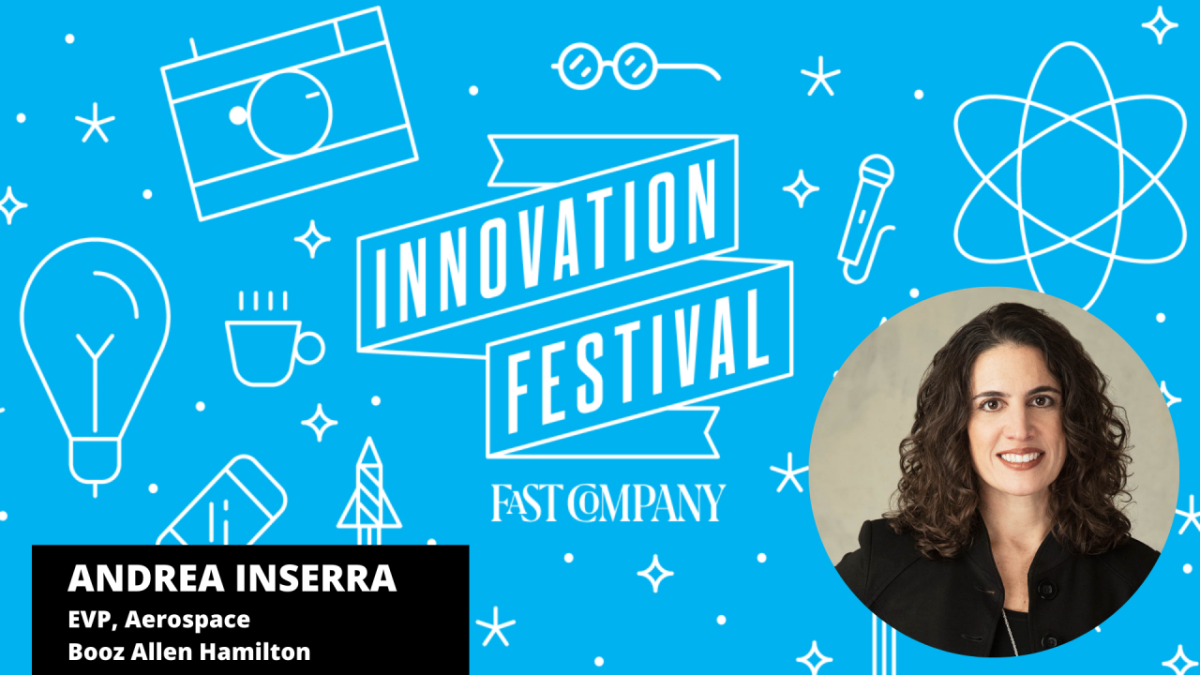Booz Allen's Andrea Inserra Talks Data, Collaboration, and Diverse Teams in the Space Sector

Last month, Booz Allen served as the Presenting Sponsor of the first-ever virtual Fast Company Innovation Festival, with firm leaders joining compelling panel discussions on innovation in government, cybersecurity, the space race, and the future of recreation. Join us as we recap these critical conversations in a dedicated series of posts.
What projects, products, ideas, and innovations are shaping the world? How can we build a truly better tomorrow? Each year, innovators from around the world convene at the Fast Company Innovation Festival to share their experiences, insights, and inspirations.
Booz Allen Executive Vice President Andrea Inserra joined General Kevin "Chilli" Chilton, a former astronaut and commander of Air Force Space Command, and Michele DiGiuseppe, the acting deputy director of systems engineering and integration for advanced exploration at NASA.
Space in 2020: More objects, data, and collaboration
“Space today looks very different than it did in the 1960s,” Inserra said. “Thanks to more commercial entities and lower barriers to entry, there are currently thousands of satellites and other space assets orbiting the earth for the weather, emergency response, defense, and beyond.”
Inserra expects that number to grow significantly, and with it, the volumes of information these space assets collect.
“As a company, Booz Allen is thinking about what to do with all of that data. How can you leverage the data, analyze it, and make better decisions?” Inserra said.
She’s also anticipating more public-private collaboration, like the recent Space X launches at Cape Canaveral/Kennedy Space Center.
“As the industry continues to fund new technologies and innovation, this will be a win for all of us,” she said. There’s an important caveat, however. “We have to create those safe open collaborative spaces for industry and the U.S. government to continuously collaborate and connect.”
An increasing need for asset protection
“People don't think about the assets in space being vulnerable,” Inserra explained. “I think most of us always just believed it was a safe sanctuary.”
Today, however, the possibility of war in space presents critical questions. For instance, if a space object like a satellite gets attacked and damaged, even in a test, what happens to the debris that continues to orbit? And what could the impact be down on the ground?
“How do we protect those assets?” Inserra asked, adding that private entities will want to make sure that their assets are protected as well.
Making space a place for all
The teams working on space projects today are very different than those 22 years ago when Inserra started her career. “Today's teams are made up of engineers, scientists, communication experts, data scientists and human system engineering leaders,” she said. “It’s a rich and diverse set of experiences from all over the globe.”
Such diversity leads to more innovation—and is something she actively cultivates in her “unstoppable team.”
“We work hard to make sure that we don't all have the same voice,” she said. “We don't all have the same background. We don't all have the same experience. And that's really to benefit our clients,” she said. “I think our solutions are much more relevant and resilient.”
How can we continue to bring diverse perspectives into the space sector? In addition to promoting the sciences, engineering, and social sciences, Inserra touted the value of “practical applications where young people can see, ‘Wow, I can be part of that,’—things like the Space Camps that NASA hosted.”
“We need to continue to fund programs that allow young people to experience what many of us have been fortunate enough to experience and give them a path forward,” she said.
Watch the full Fast Company Innovation Festival panel discussion and learn more about innovation at Booz Allen.

